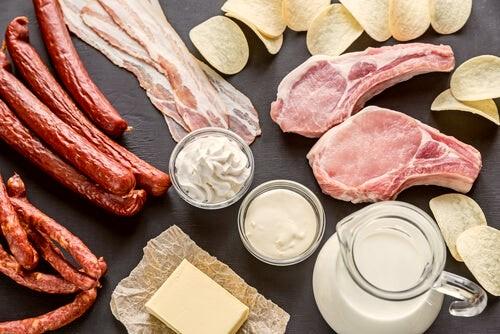
Saturated fats cause health problems when consumed in excess. It is appropriate to limit their consumption to a reduced proportion so that they do not cause undesirable effects on the body.
Saturated fats are one of the types of dietary fats that exist and eventually cause health problems. They are mainly present in foods of animal origin such as meats, egg yolks, sausages and milk, and their derivatives.
Saturated fats become solid at room temperature and are sometimes perceived with the naked eye in food, as is the case with those found in chicken skin, around red meat or in milk. Other times they are not visible, as they are used during food processing.
This type of fat is also present in some plant-based foods, such as palm or coconut oil. It has been established that high consumption of saturated fats can cause health problems and, in particular, cardiovascular diseases.
Read Also: 50 Foods That Are Super Healthy
Fats and types of fats
Fats are a nutrient that provides energy to the body so that it can function normally. If we exercise, during the first 20 minutes the body works thanks to the calories provided by carbohydrates. From then on, take the energy of fats.
Fats also play an important role in maintaining the health of hair and skin, as well as to balance body temperature and for the absorption of vitamins A, D, E and K. That is why such vitamins are called fat-soluble.
There are basically three types of fats: unsaturated, saturated and trans [1]. Let’s see:
Unsaturated fats
They are liquid to the environment and are mainly found in plant-based foods and fish. Its consumption helps to improve cholesterol levels. [2]
Saturated fats
They are also called solid fats and their high consumption increases the level of bad cholesterol, which clogs the arteries. [3]
Trans fats
These fats processed by a method called hydrogenation. They are the most harmful and are mainly in industrial foods. [4]
Effects of saturated fats
When saturated fats consumed in excess they cause problems in the body. The most relevant is that they cause an accumulation of bad cholesterol (LDL) in the arteries. When this happens, the risk of developing heart disease, arteriosclerosis or stroke is markedly increasing.
The excess cholesterol causes an injury to the walls of the arteries, called atheroma plaque. The consequence of this is that the diameter of the arteries is reduced, which hinders the passage of blood. This is what leads to cardiovascular problems.
Another undesirable effect of this type of fat is that it easily generates weight gain. And if a high volume of saturated fats ingested, especially if this is accompanied by poor physical activity, the result is overweight and obesity. Both affect notoriously health.
Myths and mistakes about saturated fats
The issue of fats and diets has been lent to popularize some myths and mistakes. The first is that in all cases it is bad to consume saturated fats. That’s not true. Healthzigzag recommends that these do not represent more than 6% of the daily food consumption.
Also, many times saturated fats eliminated from the diet. Without considering how they can be replaced for proper nutrition. The right thing in those cases is to replace saturated and trans fats with unsaturated fats, and not completely eliminate all types of fats.
Another healthy option is to increase the intake of whole carbohydrates, such as rice or whole wheat bread. Instead, it is not a good idea to replace bad fats with carbohydrates such as white flour or sugar. A study in this regard indicated that those who do this not only do not reduce the risk of cardiovascular disease but increase it.
Fats and healthy diet
The fundamental thing about a healthy diet is balance. The gold formula remains nutrition that includes many vegetables, fruits, whole grains, and unsaturated fats. In less quantity and in a regulated way, carbohydrates and saturated fats.
Estimated that the correct thing is that between 25 and 30% of daily calories come from fat. In turn, only 6-7% of these fats should correspond to saturated fats. This amounts to approximately 15 to 25 grams of this type of fat per day.
In general, it is convenient to consume foods such as industrial pastries, fatty or processed meats, whole dairy products, packaged foods or fried foods in low quantities. Of course, we can treat ourselves from time to time, but making it the exception and not the rule.




